Geladas of the Simien Mountains
Friday, November 02, 2012
 Debark, Ethiopia
Debark, Ethiopia
I barely got out this morning because it took awhile to get breakfast in the restaurant . I ordered porridge (aka oatmeal) since that was what the majority were having and it is always safer to go with the flow. It wasn't bad when I got it 2 minutes before I decided to leave to go back to the room. No honey here, but it was OK. I am still shocked that I can tolerate oatmeal after all these years of hating it.
It was going to be a long drive to the Simien Mountains National Park. The road wasn't so good so 120 km would take almost 3 hours. Sian just reminded me of the Jewish village as we left Gondar. We passed a village of Fellasha with the star of David symbol. This area is the home of the remainder of the descendants of the 1000 Jews that came with Menelik I when he returned to Ethiopia from Jerusalem where he visited his father King Solomon and was given the Ark of the Covenant. The Jews continued to live in Ethiopia until Project Solomon in the 1990's during the Civil War when Israel gave incentives to the Ethiopian Jewish people to emigrate to Israel . Kibrom says that many have returned to Ethiopia because Israel was not as they expected.
We drove through a lot of nice countryside farms while Kibrom explained marriage and politics. It seems that in the rural areas, marriages are arranged and it is now illegal for girls to marry before 18 but the southern tribes do ignore this. Of course, this is also beginning to change. The boy's family has to give land or grain (north) or cattle (south) to the girl's family and they tend to spend a lot of money. The development agents are trying to discourage this. Kibrom later mentioned that the previous prime minister set up a ministry for women's issues and women lawyers were employed to give free services to women whose rights were being abused, as in cases where a woman might be forced to marry against her will. She can go to the ministry now and have legal representation. I am trying to remember, but female circumcision may have been brought up at this point. Kibrom said this was definitely being discouraged as well.
For funerals, there is also a large expense because the funerals last for 20 days and all the neighbors come and visit the dead person's home at least twice a day to pray and support the family.
In terms of politics, Kibrom spoke about Ethiopia having an independent policy in terms of aid from foreign countries . They do not accept aid with strings and prefer to contract for road construction, etc., from the Chinese, for example. They get help from Korea, India, South Africa, and several other countries. England does give a lot of aid too. Then he talked about the failure of communism in Ethiopia and how the Red Guard killed a lot of students and 40 top generals as well. The former popular prime minister was a guerilla after being a student protestor. This man was exceptionally bright, finished high school early, entered college at an early age and was considered very exceptional. He read a lot of books while he was a guerilla. There were aides that carried his books for him during the civil war. When he became prime minister, he did a lot for Ethiopia and for Africa as a whole. He started the Pan-African Union and wanted the countries to evaluate each other in this public forum, starting with his own work in Ethiopia. He just died a few months ago and many people still mourn him and have posters about him up all over.
I think there were other questions as well - Kibrom gave a lot of info today.
We reached Debark and our hotel about 10 am. We got our room. Sian was quite pleased with it considering it was listed as a basic hotel. We have a balcony looking out onto the street. Our heavy bags were carried upstairs by pretty Ethiopian girls. My girl wanted to leave my bag in a room on the floor below rather than carrying it up to the 3rd floor . I wished I had grabbed it from her but I was dragging that day. We had a half hour before starting out. I needed to repack some of my stuff for the trek in the mountains although I had done most of it in the morning.
Once starting out, Kibrom first had to get our tickets and pick up the local guide Danny and 3 scouts....with their guns. One scout was outfitted in a Western hat, camo pants and has something that looked like an automatic rifle. They were fine though - they rode in the back of the bus with us...I was over the wheel and had both seats to myself and my baggage....I felt guilty of course. The road was being worked on, so we had some rough spots. The scenery again was gorgeous. I expected mountains to have trees and rocks. There always seem to be rocks here in Ethiopia, but the trees were rather scarce because we drove through mostly farmland: fields of wheat, some chick peas, maybe some barley and teff.
We stopped to see the Geladas . They are called Gelada baboons, but I guess technically are not actually baboons but something closely related. The are endemic to Ethiopia and we were told that they are the only grass-eating baboons - even if they aren't baboons. There was a field of them scattered around - or perhaps I should have said that they mainly inhabit these particular hills and feed on the grass. The guide said they are friendly and we could go close to them but as I tried to do just that, they moved along away from me. I saw several grooming each other; mothers with babies; many plucking the grass and eating it; some playing and some running and chasing each other. There were screeches from the edges of the field and all kinds of different noises. I tried to capture them on video but the video part of it was quite unsatisfying - I zoomed in on a male and he zoomed off faster than I could follow him with the camera and someone walked in front of me as well. I was following one male and several females and as they were grooming each other, he went over and began to hump one ....with his back to me. I took a few photos before I realized what was happening. The male baboons have luxuriant manes and a red mark on their chests as well as bright red penises.
After the geladas, we continued along in the park until we got to the edge of a huge canyon. We had our boxed lunch of omelet sandwich, boiled potato and egg, and banana here. I only had time to eat half of my lunch. We then started our walk along the rim of the canyon. There were gorgeous views into the floor of the canyon where there was a village and fields of varying greens and pale golds. As we walked we could smell the thyme. Danny the guide pointed out the thyme and a variety of heath that grows as big as a tree. It has a form of lichen - like Spanish moss - hanging from it. He also pointed our a St John's Wort tree and named the yellow flowers we had seen along our drive as Meskel daisy. They were gorgeous. I saw a type of thistle but did not get its name and he identified the solanum plant that I had seen on the walk with Kibrom in South Ethiopia and that I had mistakenly heard as "salami ."
It was a lovely walk across sheep pastures, horse pastures - we saw both animals there. We heard an ibex (one of the three endemic species along with the geladas and the Simien wolf or fox), but didn't see it. We (not always me) saw a number of birds: vultures, kestrels, and black kites. There were also trees - many of the heaths but probably others too and we walked on paths through a sort of forest. It reminded me at times of the High Atlas in Morocco. I forgot to mention that we were over 3K meters in altitude. I found myself puffing as we walked uphill. At some point, I had thought I should look up the elevations of the various places I had been in Ethiopia because the elevations are much higher than I am used to in New York - in Addis Ababa and in the southern highlands as well. But I haven't done it.
We walked to the bus and I put my pack in the bus when I realized we still had part of the walk to go. I had started putting away my sticks but now one of them would not stay extended so I left it behind in the bus . We walked farther along the rim of the canyon. It started to rain just as we reached the bus again. It rained for quite a while on our return trip before stopping. The geladas were mostly gone from their grazing spot and we didn't stop again as we had been promised. But with the rain, I don't think anyone was hugely upset.
Back at the hotel, we tried to reorganize and dry out and warm up. Sian unfortunately began to feel sick, but after lying still for a while, she felt better and thought that it was probably motion sickness. Just to be safe, she decided to skip the coffee ceremony and the buffet.
I went down for the coffee ceremony but forgot my camera. The coffee was pretty good - it was interesting to watch the woman wash the coffee beans, roast them over a charcoal fire, then pound them to a powder in a metal container. She then poured the ground coffee and water into a ceramic coffee pot which she heated over the charcoal flame . Most of us had a little cup of coffee, but just one - the usual is for everyone to have three cups. Kibrom said his mother always performs 2 coffee ceremonies a day: one in the morning and the other in the evening.
Our dinner buffet started with a huge bowl of vegetable soup and then we had some dishes and sauces. I had some things I had never had before - one sweetish flat pastry cut into diamond shapes, a spinach turnover of sorts. It was good but the consensus was that it could not beat the Four Sisters Restaurant in Gondar.
I came back upstairs to find Sian better. This hotel is not the best and it is very noisy downstairs because it is a men's drinking spot. It seems to have quieted a bit now. We leave early tomorrow so I am signing off now.
Other Entries

 Debark, Ethiopia
Debark, Ethiopia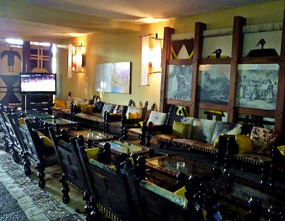
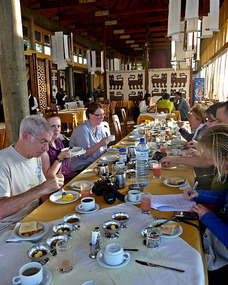
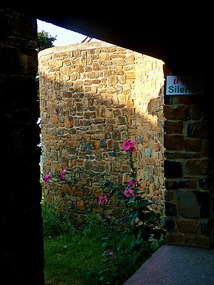
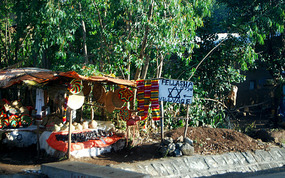
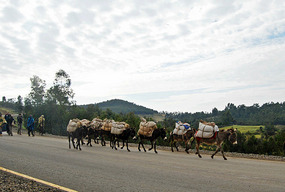
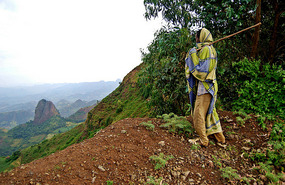
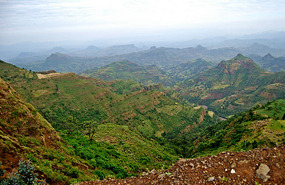
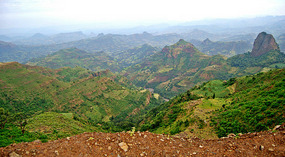
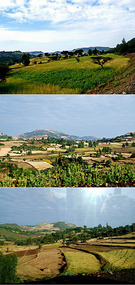






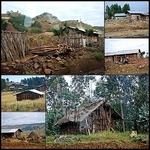
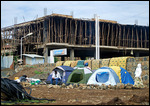

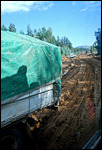
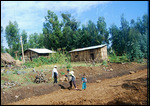



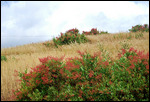

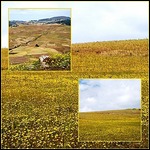
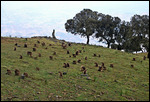
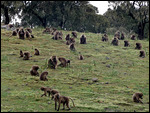
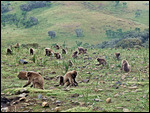

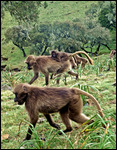
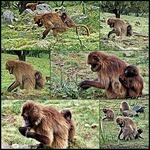
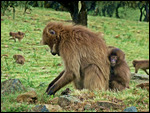
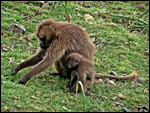
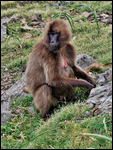
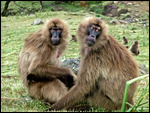
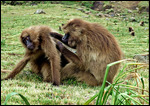
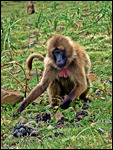
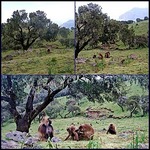


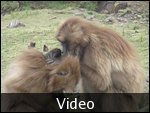
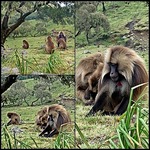
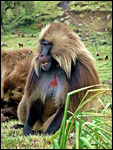
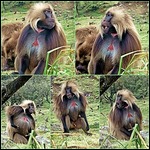
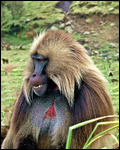
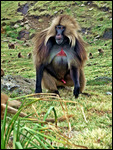
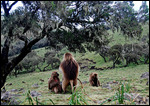





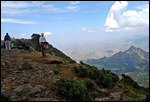
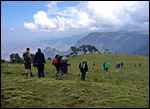
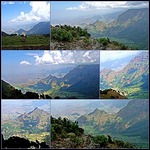




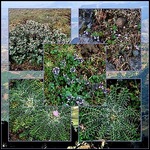
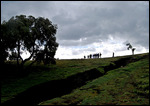


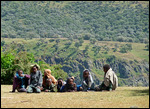
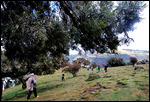

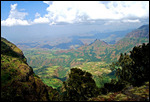

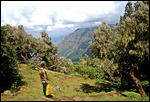

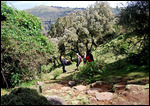
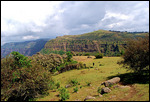
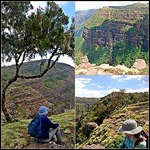
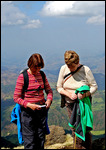

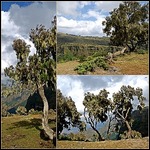
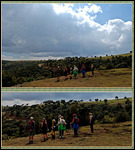
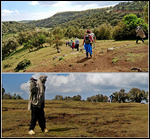


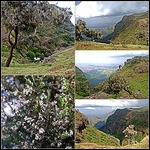


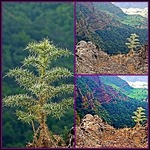

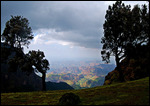
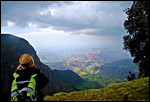
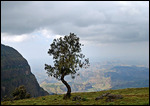

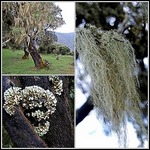
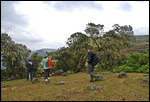
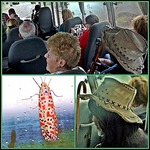
2025-05-23